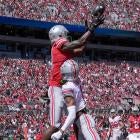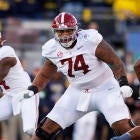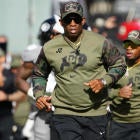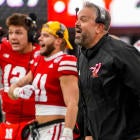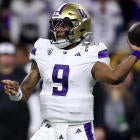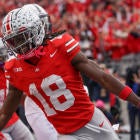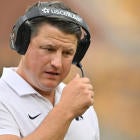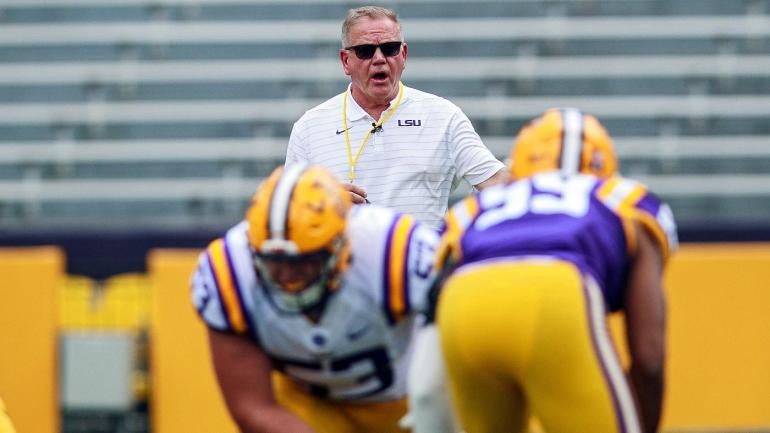
The 2021 offseason will go down as one of the craziest in history. For the first time since 1947, an Oklahoma coach left to take another collegiate job as Lincoln Riley left for USC. It had never happened at Notre Dame, at least until Brian Kelly took the LSU job. Miami, Florida and Oregon rank among the other major programs to suddenly make coaching changes.
When the dust settled, 14 Power Five programs ultimately made coaching changes. The schools ranged from blue bloods like Oklahoma and Notre Dame to middling programs looking for a fresh start like Duke and Texas Tech. Ultimately, every hire is after the same thing: To take their program to the next level.
Here is the biggest challenge that each Power Five coach will face at their new job.
Mario Cristobal, Miami
Keeping everyone in alignment: Reeling in the big fish was only one part of the equation for Miami. Perhaps more importantly, the Hurricanes poached athletic director Dan Radakovich from Clemson, stole star coordinators Josh Gattis (Michigan) and Kevin Steele (Maryland) from two Big Ten schools and encouraged former Hurricanes star Alonzo Highsmith to leave NFL front office roles to run Miami's operation. History is littered with programs that made big splashes but failed to build it long term and translate into success. Cristobal has been one of the better program managers in the nation during his time as both a head and assistant coach, but what has been a chaotic program at Miami will be his toughest challenge yet.
Kalen DeBoer, Washington
Finding a long-term quarterback: The Huskies were miserable on offense in 2021, ranking No. 114 nationally at 323.4 yards of offense per game, smack in between Kansas and Northwestern's putrid units among Power Five teams. DeBoer has been an offensive mastermind at several of his stops and has talent to work with in Seattle. In addition to highly-touted underclassman Dylan Morris – who showed some promise as a freshman – the Huskies added Indiana transfer Michael Penix to headline a top-25 transfer class. DeBoer worked with Penix at Indiana, so finding answers shouldn't take long.
Jake Dickert, Washington State
Binding his voice: Dickert earned the full-time job at Washington State after navigating the Cougars through the bizarre firing of Nick Rolovich to finish 7-6. That said, Dickert had never held a Power Five assistant coaching job before 2020. He only became an FBS coordinator for the first time in 2019. Dickert has plenty to learn, but Washington State is the perfect place for him to do that. If his staffing decisions are any indication, Dickert has the right idea. Hiring former UIW coach Eric Morris as offensive coordinator was a shrewd, unorthodox move that will pay big dividends.
Sonny Dykes, TCU
Taking his system to the next level: When TCU opted to make a coaching change, it only had to go across the Metroplex towards its longest rival to find its next coach. Dykes went 25-10 over his final three seasons at SMU, the most successful period of success since the Pony Express. However, the Mustangs failed to take the next step and truly push for a conference championship, finishing a middling 4-4 in conference in 2021. Dykes will have massive advantages at his disposal at TCU but he will have to show that his system can reach Big 12 competitiveness long term.
Mike Elko, Duke
Building a sustainable model: Winning at the elite academic schools isn't easy, but the most successful coaches have created a system to build around. At Stanford, it was physical run offenses. At Northwestern, it has been smart, tough defenses. Elko is a defensive wizard with experience at academic private powers Notre Dame, Wake Forest and Penn, so finding his market inefficiency should be an intriguing exercise. Luckily, Elko should get time.
Tony Elliott, Virginia
Maximize Brennan Armstrong: The quarterback may not be Deshaun Watson or Trevor Lawrence, but Armstrong ranks among the most productive quarterbacks in the nation. In a breakout junior season, Armstrong completed 65.2% of passes for 4,449 yards passing and 31 touchdowns. Elliott will have to work through multiple offensive line starters transferring, but Armstrong is as good of a piece to build around as any player in college football for a first-year coach. Elliott's offensive pedigree is a major part of why he got the job.
Marcus Freeman, Notre Dame
Continuing the recruiting momentum: Former coach Brian Kelly left the Fighting Irish for one reason – he didn't believe he could recruit at a championship level at Notre Dame. One class later, Freeman has the Irish as the early leader to land the No. 1 class in the nation in 2023, according to the 247Sports Composite rankings. They don't hand out trophies for elite classes nine months before signing day, but Freeman is answering all the questions Kelly couldn't to this point. If Freeman builds a championship-caliber program off the field, his underrated schematic mastery will ensure that on-field results come soon enough.
Brian Kelly, LSU
Managing expectations: The last three head football coaches at LSU have all won national championships: Nick Saban, Les Miles and Ed Orgeron. The second that Kelly accepted an offer to move from Notre Dame to LSU, the clock started on his championship chase. Short of Lincoln Riley, Kelly might be the most scrutinized coach in the nation in 2022, despite not having a roster ready for prime time. LSU did add the nation's No. 3 transfer class, but Kelly's first squad will be a transitory team at best. As long as Kelly can handle the heat, it shouldn't put a damper on the program heading forward.
Dan Lanning, Oregon
Preparing to be a head coach: Lanning has been one of the quickest risers in recent college football memory, jumping from Alabama graduate assistant in 2015 to head coach of a modern power at Oregon by the end of 2021. His schematic aptitude is not in question after learning under Kirby Smart for four seasons, but the training wheels are off as he leaves Smart to take over his own program. Lanning takes over what was the most talented roster in the Pac-12 last season, per the 247Sports Talent Composite, and found a nice mix of youth and experience on his initial staff. Still, expect the Ducks to take some time finding an identity under Lanning.
Joey McGuire, Texas Tech
Rebranding the Red Raiders: For years, Texas Tech built a clearly defined identity around explosive Air Raid football under Mike Leach and Kliff Kingsbury. While McGuire fully brought back the Air Raid, he comes from the Matt Rhule coaching tree and hopes to bring a hard-nosed, physical defensive mentality to Lubbock. The Red Raiders have struggled defensively for more than a decade at this point, and failing to build a winning defense ultimately doomed Matt Wells. If the 2023 recruiting cycle is any indication, though, McGuire has plenty to sell.
Billy Napier, Florida
Rebuilding the recruiting operation: Napier is a solid Xs-and-Os coach, but what sets him apart after major experience under both Dabo Swinney and Nick Saban is his recruiting structure. While at Louisiana, Napier did an elite job of identifying, recruiting and developing, which led to three straight No. 1 classes in the Sun Belt from 2019 to 2021. Dan Mullen was fired at Florida largely for his inconsistency on the recruiting trail, and Napier should be the polar opposite. Napier's first staff leans slightly Louisiana heavy, but there's little question that Napier will deploy his staff in a productive way. Three of the four top-200 recruits in Florida's 2022 class committed after Napier's arrival.
Brent Pry, Virginia Tech
Get back to Hokies football: Virginia Tech is getting back to the basics by hiring a relatively anonymous, hard-nosed, defensive workman who GA'd under Frank Beamer to lead the program. Pry is a longtime James Franklin confidant and has played a critical role in Franklin's meteoric rise with his fundamentally sound defense. Virginia Tech hasn't consistently played to its identity since Bud Foster retired in 2019. Pry fits the southern Virginia Tech culture better than Justin Fuente ever could.
Lincoln Riley, USC
Winning: It's that simple. After all the fanfare, Riley must get USC back to national contention from Year One. The Trojans ranked top 10 in the 247Sports Talent Composite in 2021, and bolstered it with perhaps the greatest transfer class in the history of football. Heisman contending quarterback Caleb Williams followed Riley from Oklahoma, and Biletnikoff-winning wide receiver Jordan Addison joined the fray in May. Eleven defensive transfers enrolled to rebuild Alex Grinch's defense. There will be no transition. USC will have College Football Playoff expectations right away. The pressure is unprecedented.
Brent Venables, Oklahoma
Instilling a defensive culture: The last three NFL Drafts have proven once and for all that talent is not the main issue holding back OU's defense. Ten Sooner defenders were drafted in the last three seasons, including five in the first three rounds. To turn things around, Venables' cultural management will be key. Clemson boasted one of the most physical, defensive units in the nation during Venables' decade at the helm, which played a major role in two national championship runs. Venables has been a leader of men during his 25 years as a college assistant, and his first coaching job should be no different.














